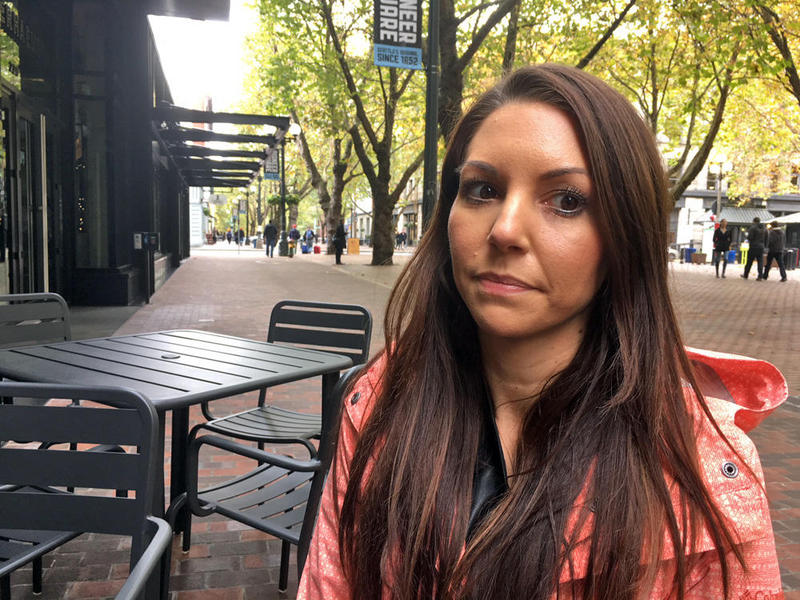
Women Speak Out, Name Names After Report On Sexual Harassment In State Capitol
Listen
It’s been an eventful and, for some, an emotional week in Olympia. On Tuesday, a story was reported about women being sexually harassed in the state legislature. That reporting was in collaboration with The News Tribune of Tacoma and The Olympian. Since that story broke, more women have come forward on social media and in person to tell their stories of harassment at the Capitol.
At an outdoor café in downtown Seattle, Samantha Kersul holds the hand of a friend and tells the story of what happened to her one evening in 2009. She was out with some Democratic state lawmakers at a bar in downtown Olympia. Kersul, who was 25 at the time and trying to get a full-time job with the legislature, said at one point she got up to go to the bathroom and a state Representative named Brendan Williams followed her. But before she reached the bathroom …
“He pushed me against a wall and he shoved his tongue down my throat. And I say it with that language because that’s what happened,” Kersul said.
Kersul said she pushed him off of her and yelled at him. She said that as she hurried out of the bar, Williams offered to write her a recommendation letter.
“And I’m still so angry about that because I think at that point I realized he was telling me how much power he had over me,” Kersul said. “That he could help my career or he could hurt my career.”
Kersul is one of four women to make allegations against Williams, who is no longer in elected office. Those allegations were first reported by the Associated Press. They followed our reporting on the workplace climate at Washington’s Capitol — a place where women we talked to said that unwelcome comments, attention and touching from male lawmakers and lobbyists are common. Some also told us they were inappropriately touched. Most said they did not report these behaviors for fear of it would hurt their careers. That’s why Kersul said as a 25-year-old she didn’t report what happened to her.
“I didn’t trust the institution,” Kersul said. “I didn’t trust the process. I didn’t trust that there was a way for me to come forward and not have it in some way jeopardize my ability to advance in my career.
In a statement, Williams wouldn’t address specific allegations against him but said “my past actions, on a few occasions, caused pain, and I own that responsibility and sincerely apologize.” Kersul is now a top official with the Washington state Senate Democratic Campaign Committee. And she’s one of several women who are describing experiences they’ve had while working in and around Washington’s legislature. Kersul says she decided to tell her story now in hopes it helps change the culture in Washington’s Capitol.
“There has to be a way for all victims to come forward safely and not feel ashamed or threatened,” Kersul said.
House Majority Leader Pat Sullivan, a Democrat, agrees.
“We have to have a culture where people feel comfortable,” Sullivan said.
To that end, Sullivan said the Washington House of Representatives has been reviewing its harassment policies and procedures since January. He said the goal is to create a new policy that creates certainty.
“When an individual comes forward with an issue of harassment that we address it or they’re not going to come forward. And that’s something that has to be fixed,” Sullivan said.
But already women said something has changed. Sitting with Kersul as she told her story was lobbyist Rebecca Johnson.
“I hear conversations happening in a much more real way than I ever have before and I see the opportunity to help both for myself and my colleagues who I’ve been with all this time but also for the women coming up behind us,” Johnson said.
Copyright 2017 Northwest News Network
Related Stories:

Federal funding cuts, freezes hit Palouse nonprofits
Palouse area nonprofits focused on helping with emergency food and the arts have had their funding frozen or cut.

Why affordable housing providers say they’re facing an ‘existential’ crisis
Affordable housing providers across the Northwest have been contending with rising insurance premiums — and, in some cases, getting kicked off their plans altogether.

Pacific Northwest author’s new novel captures atmosphere of the region
On a gray, early spring morning, I drove to Steilacoom, Washington, to catch the ferry to Anderson Island. I boarded alongside the line of other cars and after parking, stepped out onto the deck of the boat. The ferry pushed off from the dock and rocked a little in the Puget Sound before steadying.
I took this journey to the real Anderson Island to see from the water what inspired Northwest author Kirsten Sundberg Lunstrum’s new novel, “Elita,” which was published earlier this year. Sundberg Lunstrum was inspired while sailing around the Puget Sound to write a mystery novel on an island.
Sundberg Lunstrum read excerpts of the book at a gathering at Tacoma’s Grit City Books.












